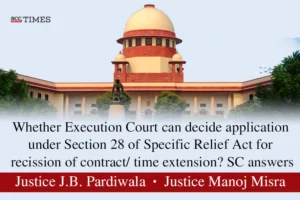Supreme Court: While considering the instant appeal revolving around specific performance of contract, the Division Bench of J.B. Pardiwala and Manoj Misra, JJ., held that an application under Section 28 of the Specific Relief Act, 1963, either for recission of contract or for extension of time, can be entertained and decided by the Execution Court provided it is the Court which passed the decree in terms of Section 37 of the CPC.
Background and Contentions:
The agreement, of which specific performance was sought, was entered into in 2005. The suit for specific performance was filed in 2006. The Trial Court partly decreed the suit, inter alia, for refund of the earnest money in 2011. The plaintiffs (respondents and decree holders herein) being aggrieved by rejection of their prayer for specific performance of the agreement, filed an appeal before the Appellate Court. The Appellate Court allowed the appeal in 2012 and directed the defendants/judgment debtors (appellants) to execute the sale deed on payment of balance consideration within two months from the date of the Appellate Court order, failing which the plaintiffs were entitled to get the sale deed executed through Court. The decree attained finality upon dismissal of second appeal filed by the appellants in 2013.
Upon dismissal of the second appeal, the respondents filed an application before the Execution Court in 2014 seeking permission to deposit the balance consideration in Court. The Execution Court, rejected the application of the appellants for rescission of the contract vide order dated 03-11-2016 and, simultaneously, permitted the respondents to make deposit of the balance consideration.
Aggrieved by the aforesaid order of the Execution Court, the appellants filed a Civil Revision before the Punjab and Haryana High Court, which came to be dismissed by the impugned order.
Counsel for the appellant raised objection over the jurisdiction of the Execution Court to extend the time for depositing the balance consideration as the decree under execution was passed by the Appellate Court.
Per contra, the respondents argued that execution application was filed in the same Court where the original suit was instituted, therefore, the Execution Court had jurisdiction to extend the time to make deposit. Furthermore, the appellants were offered balance consideration within time, and the execution application was also filed within time, but, instead of executing the sale deed, the chose to prefer a second appeal.
Issues before the Court: The Court had to deliberate that:
-
Whether the Execution Court had jurisdiction to deal with the application(s) for recission of contract and extension of time to deposit the balance sale consideration?
-
If yes then whether those applications ought to have been decided as one in the suit (i.e., original side)?
-
Whether any interference under Article 136 of the Constitution was required in the instant matter?
Court’s Assessment:
Answering 1st Issue in affirmative, the Court stated that Execution Court had jurisdiction to deal with the applications for recission of contract and extension of time to deposit the balance sale consideration provided it is the Court which passed the decree in terms of Section 37 of the CPC.
The Court pointed out that in the instant case the Court of first instance (i.e., where the civil suit was instituted) was the Court of Additional Civil Judge (Senior Division), Kaithal. The execution application was also filed before the Court of Additional Civil Judge (Senior Division), Kaithal, Thus, by virtue of Section 37 of the CPC, the Execution Court being the Court of first instance with reference to the suit in which the decree was passed had jurisdiction to deal with the application under Section 28 of Specific Relief Act, 1963.
Answering 2nd Issue, whether the application under Section 28 of the 1963 Act ought to have been dealt with as an application on the original side or on the execution side (i.e., as an application in the execution proceedings). The Court pointed out that this issue is no longer res integra as it has been answered in Ramankutty Guptan v. Avara, (1994) 2 SCC 642.
It was pointed out that vis-a-vis the 2nd Issue, law is, therefore, settled that an application seeking rescission of contract, or extension of time, under Section 28 (1) of the 1963 Act, must be decided as an application in the original suit wherein the decree was passed even though the suit has been disposed of. As a sequitur, even if the Execution Court is the Court of First Instance with reference to the suit wherein the decree under execution was passed, it must transfer the application filed under Section 28 to the file of the suit before dealing with it.
Regarding Issue no. 3 revolving around the requirement of interference under Article 136 of the Constitution, the Court delved into the trajectory of the dispute and conduct of the parties. The Court also considered whether the decision of the Execution Court, did substantial justice to the parties.
The Court opined that the respondents had all throughout shown their intention to pay the balance consideration for execution of the sale deed whereas the appellants appeared interested only in challenging the decree before higher Courts. In these circumstances, taking note of all the events, the Execution Court justifiably exercised its discretion in favour of the respondents aka decree holders, by allowing them to deposit the balance consideration.
Therefore, substantial justice has been done to the parties and if the Court interferes with the impugned order only on the technical ground that the application was not dealt with as one on the original side, grave injustice would be caused to the respondents. More so, when the appellant aka the Judgment debtors themselves applied to the Execution Court for rescinding the contract under Section 28(1) of the 1963 Act and raised no such jurisdictional issue either before the Execution Court or the High Court.
CASE DETAILS
|
Citation: Appellants : Respondents : |
Advocates who appeared in this case Subhasish Bhowmick for the appellant(s): For Respondent(s): |
CORAM :

